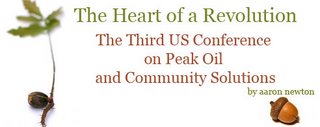
A Summary: Beyond Energy Alternatives
The Third
September 2006 Yellow Springs,
Albert Einstein said, “We cannot solve our problems with the same thinking we used when we created them.” He also said, “Any fool can make things bigger, more complex, and more violent. It takes a touch of genius-and a lot of courage-to move in the opposite direction.” I spent the weekend with genius and with courage, and I am happy to report that they are alive and well and working on our problems. Most Americans are not yet familiar with the coming tide of instability. Asleep and dreaming the American Dream, many are unaware of the issues associated with energy and environment that face our people and all of humankind. Scores of those who are aware of our troubles have convinced themselves that the answer lies in more of the same. But there are those who have another idea.
What a wonderful experience to be able to share a weekend with those who understand the need for change. I am excited and inspired and more full of hope than I have been in quite a while. I come away from the experience better informed and ready for action. I am happy about the friendships that grew out of the conference, and I am grateful for those who came to share the comprehension necessary for the next step. The time has come. We are ready to deploy our weapons of mass sustainability. Sharon Astyk made the remark that with an attendance of more than 250 people, the Third US Conference on Peak Oil and Community Solutions had more than the necessary number of people required to start a revolution. It is here. The time is now.
There are many well-meaning environmentalists moving to activate change in alternative fuel types, emission standards, pollution regulations and more. I have been dismayed though that these substitutes are at the forefront of the response to a peak in global oil production and the coming climate change. I don’t doubt that the best of intentions are in mind when these “business as usual” suggestions are made. I continue to be skeptical though concerning the effectiveness of the message that “more is still better” and “all is possible if only we believe.” Plan B has been the idea that more, bigger and faster is an acceptable idea and that we need only switch from one fuel source to another. More power plants are not a problem. We’ll just pump the pollution underground. More cars are not a problem. We’ll just fuel them with corn. More of everything isn’t a problem we’ll just… This has been the approach.
So while everyone else is scrambling to perpetuate the status quo, I went to
Consumerism sucks. After September 11, 2001, I was told that the best thing I could do for my country was to go shopping. What a joke. There has been no real examination of the problem- we are taking too much. If the practice of consuming as much as possible leads to a better life, then it might be something worth fighting for. But it doesn’t. Americans are fat and sick and disconnected from the natural world and from each other. We are in desperate need of health, we are in desperate need of time spent outside, and we are in desperate need of quality relationships in community with others. We have become desperate people. More than one quarter of us are reported to be seeking a simpler way of life. Given a choice, I think citizens (currently called consumers) of the
On Friday evening, David Orr framed the problem and on Saturday night Vicki Robin tempered our typical response. We were ready for the alternative presented by Pat Murphy and for the vision of Peter Bane. Along the way, it was incredibly inspiring to hear from Richard Heinberg, Julian Darley, Bob Brecha, Richard Olkson, Sharon Astyk, Megan Quinn and Jeff Christian about where we are going and what might be best way to get there. I was able to spend time with some of the speakers and audio of those interviews is forthcoming. So much good thought to share. I told my wife over the phone that I would need to take the rest of the year off to digest, write about and put in practice all I had learned over the course of one weekend. How else could a summary describe the success of this conference? Maybe I could write about how easy it was to talk to strangers or how beautiful the campus of
When I left the closing remarks of the weekend on Sunday afternoon, I lingered on the main lawn of the campus under the shade of an old oak tree. It was in full fruit and the acorns were beautiful and bountiful. I picked quite a few. Would you like one? Would you like to take a seed and watch it grow? Would you like to be a part of a revolution, because we’ve got one and it is ready to run. I will send you an acorn for care and management. I hope for a progress report now and again. It will not be a hands-off experience. It will require getting a bit dirty, caring for and being responsible about a new (very old) way of being accountable and conscious concerning how you live and what is important in life. I will send you a seed, a physical representation of a weekend spent in planning about how we will respond as individuals and as a community to peak oil and climate change. All it takes is commitment. Join me. Grow trees. Nurture life. Cultivate the spirit of change and the path towards the answer to our problems. I am excited.
If you are interested in growing one of these important Oaks please email me: aaron"AT"groovygreen"DOT"com


No comments:
Post a Comment